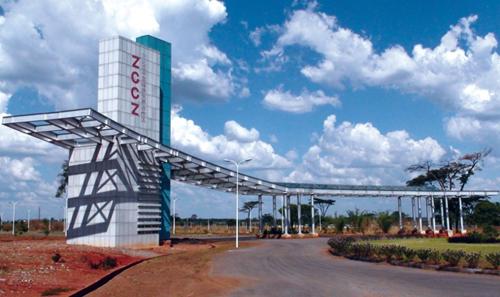With the development of China-Africa economic and trade cooperation, China has built six economic and trade cooperation zones in Africa, but more challenges to sustainable development have emerged, Global Time quoted an expert as saying.
Song Wei, an associate researcher with the Chinese Academy of International Trade and Economic Cooperation, cited the Zambia-China Economic and Trade Cooperation Zone as an example, saying that amid the global financial crisis in 2009, the Zambia-China Economic and Trade Cooperation Zone began to build an industrial park in the Zambian capital Lusaka.
Near the Lusaka International Airport, the park provides links to the markets of Zambia and southern Africa with a focus on the development of business services, modern agriculture, processing and manufacturing, real estate and ancillary services. Its development goal is to become a modern airport industrial park that functions as a free trade zone.
However, as of July 2017, only a small portion of the park had been built, and only two companies were operating there. This situation reflects the challenges facing the Lusaka park.
The infrastructure outside the park is poor. The supporting infrastructure outside the park is the responsibility of the host government.
However, due to low investment by the Zambian government, weak infrastructure has become a bottleneck in the economic development of the park. In terms of transportation, problems like high costs, long import and export cycles and inadequate logistics are prominent.
Local policies on such issues as taxes are inconsistent. Zambia has a multi-party system, and alternating administrations are likely to make changes in laws and policies. To repay political favors, each new government may rescind privileges granted to foreign investors by the previous government.
He continued there are also funding shortages. Economic and trade cooperation zones require large investment and have long payback periods. Most of these zones face different degrees of financial pressure, including the Zambia-China Economic and Trade Cooperation Zone.
The construction costs of supporting facilities in such a zone can be two to three times more than for domestic ones. Depending purely on corporate stakeholders to fund the park means the park could be a highly risky bet.
He warned security is another concern. Health problems in Zambia are serious, and diseases spread quickly, posing a serious threat to Zambian workers.
Moreover, there is an unfavorable public opinion environment. Western countries constantly make claims of neocolonialism, resource plundering, disregard for human rights and the China threat theory in Zambia. This magnifies small problems and puts Chinese companies at the center of controversy.
The lack of professionals is also an issue. The Zambian government requires that foreign-invested enterprises must employ eight local people for each work visa issued. So if China wants to invest in technology-intensive industries in Zambia, it will inevitably face labor shortages, the expert emphasized.
Therefor, the expert gives several proposals as follows:
• The Chinese government should increase communication and guidance through such means as bilateral high-level coordination, financial support and human resources, to promote the sustainable development of China-Africa economic and trade cooperation zones.
• The Chinese government needs to strengthen government-to-government communication. The host governments of parks are encouraged to promote preferential policies and provide the necessary supporting infrastructure.
• The Chinese government also needs to strengthen capital guidance. The Chinese government can use the newly established China-Africa Production Capacity Cooperation Fund to support the establishment, management and promotion of special economic zones.
This fund can overcome the financing bottlenecks facing infrastructure at the early stage, provide financial support for the management of the special zone and promote established development zones.
• In addition, foreign aid funding can help build supporting infrastructure outside the park.
• The Chinese government also needs to expand human resources training. China can start with exchange programs between representatives of African governments and managers of special economic zones, creating a comprehensive and pan-African special economic zone training exchange program.
• The Chinese government can also provide technical education and training in key industries in special economic zones.
Under the framework of the China-Africa Cooperation Forum, the Chinese government can provide education and training services to African governments in accordance with the industrial requirements of the special economic zones to meet the employment needs of enterprises that want to enter the park.




 A single purchase
A single purchase









